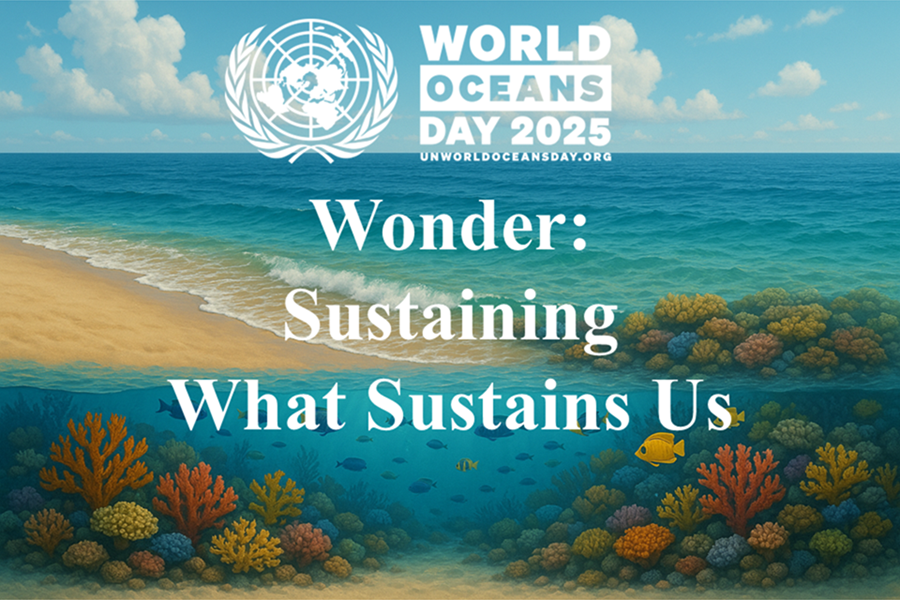World Oceans Day and Coral Triangle Day: Guardians of the Blue Planet in Uncertain Times
🌊 World Oceans Day and Coral Triangle Day
Each June, global attention turns toward the ocean—our planet’s shared life source. World Oceans Day (June 8) and Coral Triangle Day (June 9) are more than symbolic moments; they are international calls to protect marine ecosystems that support climate resilience, biodiversity, and human well-being. This year, however, one notable absence underscored growing concerns: U.S. government scientists were restricted from attending the UN’s Ocean Conference and associated World Oceans Day events in Nice, France.
🌍 World Oceans Day – Global Awareness with a Missing Voice
World Oceans Day brings together scientists, policymakers, environmental groups, youth activists, and Indigenous leaders to celebrate progress and accelerate change. But the 2025 observance was marred by the absence of U.S. federal agency participation, including NOAA scientists who have historically played a leading role in global ocean data, climate modeling, and marine policy coordination. Their non-attendance—reportedly due to administrative barriers—raised concerns about the U.S. stepping back from its traditional leadership in ocean governance. While independent scientists and NGOs still represented American expertise, the absence of federal voices created a vacuum in discussions about climate finance, marine protected areas, and sustainable fisheries.
🐠 Coral Triangle Day – Regional Leadership Shines
In contrast, Coral Triangle Day continued to showcase strong regional collaboration among six countries in Southeast Asia: Indonesia, Malaysia, Papua New Guinea, the Philippines, Solomon Islands, and Timor-Leste. Often called the “Amazon of the Seas,” the Coral Triangle is the most biodiverse marine area on Earth. Coral Triangle Day celebrations emphasized ocean literacy, sustainable seafood, reef restoration, and community-driven conservation. With increasing threats from warming waters, sea level rise, and overfishing, local leadership took center stage—demonstrating that regional cooperation can flourish even when global powers falter.
🌐 Connecting the Dots: Common Resources, Shared Responsibility
The ocean is not owned by any one nation. It is a common resource—governing its health requires transnational trust, shared data, and multilateral commitment. When leading countries retreat from scientific collaboration or global forums, the effects ripple outward. Climate models become less complete. Trust in shared governance erodes. Policy gaps widen. That’s why the silence of a major stakeholder like the U.S. at a moment of escalating climate urgency is more than symbolic—it’s consequential. In contrast, the Coral Triangle’s local resilience and grassroots innovation remind us that leadership can emerge from the ground up.
🗓️ How You Can Participate—Now More Than Ever
Whether or not your government shows up, you can. The beauty of World Oceans Day and Coral Triangle Day lies in their decentralized action model:
- Attend local or virtual events on ocean science and marine life.
- Support organizations working on coral reef restoration or sustainable fisheries.
- Share ocean literacy resources using #WorldOceansDay and #CoralTriangleDay.
- Push for policy accountability—ask why government agencies weren’t present this year.
- Choose sustainable seafood and reduce plastic waste in your daily life.
🌟 Final Words
This year’s observances carried both inspiration and concern. The world continues to celebrate the ocean—but we must also ask hard questions about leadership, responsibility, and global solidarity. If a country like the United States, with its vast coastline and scientific resources, begins stepping back from global ocean forums, what message does that send? And more importantly, who will step up to fill the gap?
The good news is that ocean stewardship isn’t limited to governments. Scientists, youth, Indigenous leaders, coastal communities, and everyday citizens are all part of the solution. Now more than ever, we need shared science, sustained action, and a unified voice to defend the ocean that defends us.
🌐 Dynamic Links: Learn More & Get Involved
- World Oceans Day – Official Site (UN & Partners):
: https://unworldoceansday.org/ - UNESCO – Ocean Decade and Marine Programmes:
: https://oceanexpert.org/event/4109 - Coral Triangle Day – Coral Triangle Initiative (CTI-CFF):
: https://www.coraltriangleinitiative.org/events/coral-triangle-day - CTI-CFF – Coral Triangle Initiative Official Portal:
: https://www.coraltriangleinitiative.org/ - Wikipedia – World Oceans Day Overview:
: https://en.wikipedia.org/wiki/World_Oceans_Day - Wikipedia – Coral Triangle and Biodiversity Significance:
: https://en.wikipedia.org/wiki/Coral_Triangle - NOAA – Ocean Acidification Program:
: https://oceanacidification.noaa.gov/ - NASA Earth Observatory – Ocean Warming & Climate Change:
: https://earthobservatory.nasa.gov/features/OceanWarming
🔍 Explore More with GenAI
Want to dive deeper into ocean science, climate impacts, or regenerative solutions? Try asking GenAI questions like:
- Why does ocean warming lag behind atmospheric warming?
- How much sea level rise comes from thermal expansion at current ocean temperatures?
- What causes ocean acidification, and how does it affect coral reefs?
These and many similar prompts are explored using Regenerative Dynamic AI (rdAI) tools in the book
📘 Perpetual Sustainability: Leveraging Regenerative AI for Climate and Community Action by Hall (2025).
👉 Browse the Perpetual Innovation(tm) series of Books.
Authorship: Developed with assistance for ChatGPT 4o (2025). Image art by DALL-E based on article.

